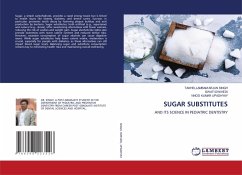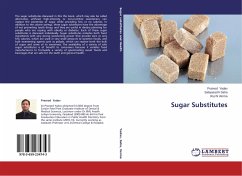
Sugar Substitutes
For every Sweet Tooth
Versandkostenfrei!
Versandfertig in 6-10 Tagen
41,99 €
inkl. MwSt.

PAYBACK Punkte
21 °P sammeln!
Sweetness is the taste that is strongly identified with celebration and happiness. Having a sweets tooth has been described as a "human weakness," as evidenced by the ubiquity of sugar bowls, candy counters, automatic candy machines, bakery and pastry shops, and the soda fountain. Fruits, berries, and honey were the earliest sweet foods known. The majority of sugar substitutes approved for food use are artificially synthesized compounds. However, some natural sugar substitutes are known including sorbitol and xylitol, which are found in berries, fruit, vegetables and mushrooms. Other natural s...
Sweetness is the taste that is strongly identified with celebration and happiness. Having a sweets tooth has been described as a "human weakness," as evidenced by the ubiquity of sugar bowls, candy counters, automatic candy machines, bakery and pastry shops, and the soda fountain. Fruits, berries, and honey were the earliest sweet foods known. The majority of sugar substitutes approved for food use are artificially synthesized compounds. However, some natural sugar substitutes are known including sorbitol and xylitol, which are found in berries, fruit, vegetables and mushrooms. Other natural substitutes are known but are yet to gain official approval for food use. Another important group of non-sugar sweeteners are the polyols. These are generally less sweet than sucrose, but have similar bulk properties and can be used in a wide range of food products.












